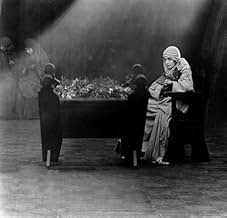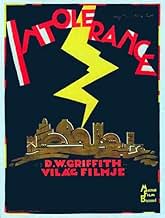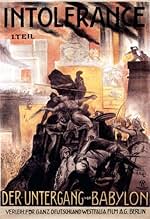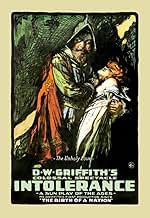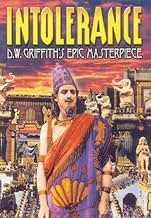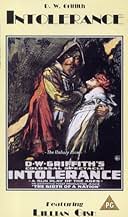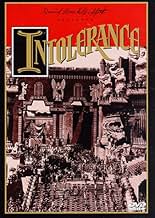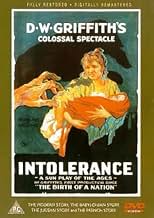Four historical tales depict the ongoing human struggle against prejudice and inhumanity.Four historical tales depict the ongoing human struggle against prejudice and inhumanity.Four historical tales depict the ongoing human struggle against prejudice and inhumanity.
- Awards
- 2 wins
F.A. Turner
- The Dear One's Father
- (as Fred Turner)
Julia Mackley
- Uplifter
- (as Mrs. Arthur Mackley)
John P. McCarthy
- Prison Guard
- (as J.P. McCarthy)
Storyline
Did you know
- TriviaDuring filming of the battle sequences, many of the extras got so into their characters that they caused real injury to one another. At the end of one shooting day, a total of 60 injuries were treated at the production's hospital tent.
- GoofsOne of the early title cards in the Judean sequence refers to Jesus having been from "the carpenter shop in Bethlehem". Though he was born in Bethlehem, he worked with his father in a carpenter shop in Nazareth, which is why he was known as Jesus of Nazareth.
- Quotes
Intertitle: When women cease to attract men, they often turn to reform as a second option.
- Crazy creditsConstance Talmadge is credited as 'Georgia Pearce' for her performance as Marguerite de Valois in the French Story. She is credited under her own name in the role of The Mountain Girl in the Babylonian Story.
- Alternate versionsThe movie was officially restored in 1989 by Kevin Brownlow and David Gill for Thames Television. It was transferred from the best available 35mm materials, color-tinted per D.W. Griffith's intent, and contains a digitally recorded orchestral score by Carl Davis. This 176-minute version was released on video worldwide, but has never been telecast in the U.S.
- ConnectionsEdited into The Fall of Babylon (1919)
Featured review
Four storylines are followed. The first is set in the modern world, where The Dear One (Mae Marsh) and her beloved The Boy (Bobby Harron) are struggling to survive. He loses his job due to union striking after a pay cut mandated so that the company boss can fund his sister's charity work. That same charity takes away the Dear One's child, citing neglect, as the Boy is sent to jail after resorting to crime.
The Biblical "Judean" story recounts how intolerance led to the crucifixion of Jesus. This sequence is the shortest of the four.
The third story details the events of the St. Bartholomew's Day Massacre of 1572 where Huguenot protestants were killed under orders of the Catholic royalty.
The fourth story is set in ancient Babylon, and deals with a religious struggle between different sects that leads to their conquest by the Persians.
Griffith's masterpiece is a marvel of narrative and structural complexity for the time, and the Babylon scenes are truly awe-inspiring in their scope and ambition. The story, in which instances of "intolerance" are illustrated throughout the ages, is a bit muddled and more than a little pretentious, but the visualization is second-to-none.
It's been put forth that Griffith made this as a sort of apologia for the racial insensitivity of his previous mega-hit The Birth of a Nation, but Griffith scholars disagree, and say that Griffith was never ashamed by the racist nature of his last movie, and that the intolerance that he was speaking out against was that which had been directed at him over that film (shades of our current political climate).
Regardless, this ended up being the most expensive film ever made up to that point, and was a major flop at the box office, from which Griffith never really recovered. The film now stands as a colossal achievement, and a precursor to historical epics to come. There are various versions in circulation.
The Biblical "Judean" story recounts how intolerance led to the crucifixion of Jesus. This sequence is the shortest of the four.
The third story details the events of the St. Bartholomew's Day Massacre of 1572 where Huguenot protestants were killed under orders of the Catholic royalty.
The fourth story is set in ancient Babylon, and deals with a religious struggle between different sects that leads to their conquest by the Persians.
Griffith's masterpiece is a marvel of narrative and structural complexity for the time, and the Babylon scenes are truly awe-inspiring in their scope and ambition. The story, in which instances of "intolerance" are illustrated throughout the ages, is a bit muddled and more than a little pretentious, but the visualization is second-to-none.
It's been put forth that Griffith made this as a sort of apologia for the racial insensitivity of his previous mega-hit The Birth of a Nation, but Griffith scholars disagree, and say that Griffith was never ashamed by the racist nature of his last movie, and that the intolerance that he was speaking out against was that which had been directed at him over that film (shades of our current political climate).
Regardless, this ended up being the most expensive film ever made up to that point, and was a major flop at the box office, from which Griffith never really recovered. The film now stands as a colossal achievement, and a precursor to historical epics to come. There are various versions in circulation.
- How long is Intolerance?Powered by Alexa
Details
Box office
- Budget
- $385,907 (estimated)
- Runtime2 hours 43 minutes
- Sound mix
- Aspect ratio
- 1.33 : 1
Contribute to this page
Suggest an edit or add missing content

Top Gap
By what name was Intolerance: Love's Struggle Throughout the Ages (1916) officially released in Canada in French?
Answer

